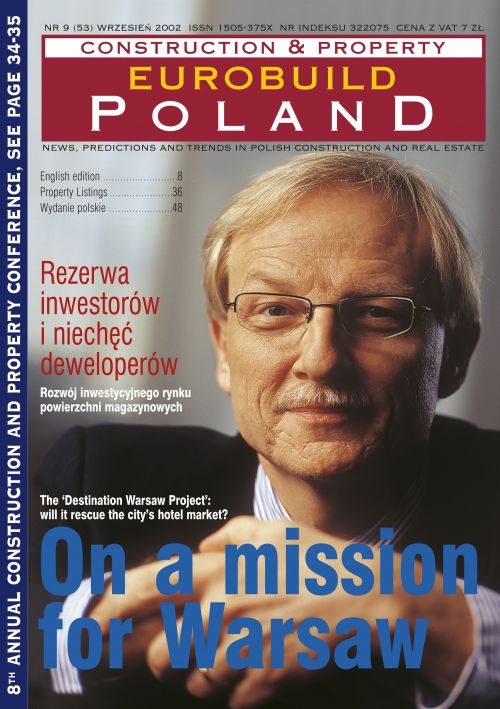Can an income stream from property investment in Poland be guaranteed?
Certainty, this is what institutional investors require as far as income stream from potential investment properties is concerned. In this article, we would like to highlight a problem which arises from the potential application of Article 475 of the Polish Civil Code, which could possibly undermine that certainty in Poland.
Over the past ten years, institutional investors have been paying close
attention to the possibility of investing in property in Central and Eastern
Europe. In cases where countries in the region have been able to reform relevant
laws, so that certainty and security of income stream from investment property
can be guaranteed, investors have been able to acquire and develop such property.
When countries in the region have not been able to create the legal and
commercial framework for such investments, institutional investors have stayed
away. As things stand, there is not a great deal of institutional investment in
property, in all of the countries in the region.
Where Poland has been able to create the appropriate commercial and legal
environment, institutional investment has been possible and there have been
clear, tangible economic benefits as a result. However, there remain several
legal obstacles to overcome in Poland, in order to provide further security and
certainty, as far as income streams for potential institutional real estate
investors are concerned. To be blunt, Poland is currently home to hesitant and
speculative investment possibilities, with inherent and often insurmountable
risks that need to be accepted as part of the general project risk.
Readers will be aware that investment opportunities in completed and/or tenanted
buildings are assessed with reference to many variables including, importantly,
the strength of lease/s of space in the building.
The key components required for leases of real property, to contribute to
creating an investment which would be considered of institutional standard,
include the following:
-
A long term agreement (up to 20-25 years), generally without any tenant break rights.
-
Full market rent with upwards only rent reviews on full market terms.
-
Clear rent for the term of the lease. This means in practice, that the tenant of a single occupied building would be fully responsible for the repair, (and if necessary replacement), and insurance of the building. In a multi-occupied building, the tenants, through the service charge, pay for the full cost of repair and if necessary replacement of the building, the full cost of running all services and the full insurance cost. ("Building" for these purposes would include the landlord's fixtures and plant such as lifts, air conditioning, electrical equipment, etc.) It is for this reason that the institutional form of lease is often referred to as an "FRI lease" (fully repairing and insuring).
-
Tight controls on the tenant's right to dispose of the lease and maintenance of the liability of the original tenant and the guarantor throughout the term of the lease, (wherever possible).
-
Tight controls on use and alterations.
-
The residual risks in the building, (for instance, defects in its original design or uninsured damage), being passed to the tenant where possible.
It is generally difficult to obtain a property investment which includes these
components in Poland because of several vital legal issues. Firstly, it is
generally accepted that a commercial lease in Poland can not be for a term
longer than 10 years. Any optional clause in a lease to extend for a period
beyond ten years or an agreement for a further lease term or lease agreement at
the expiry of ten years, is generally seen as unenforceable. The courts/arbitrators
charged with reviewing such an arrangement would most likely conclude that the
parties concerned were attempting to circumvent the intention of the legal limit
of ten years.
Another critical issue preventing the parties to a lease agreement from creating
an institutional grade investment, is the restriction provided by article 475 of
the Polish Civil Code. One interpretation of this provision is that if the
subject matter of a commercial agreement no longer exists, the agreement in
relation to the subject matter, expires. The concept is similar to the common
law concept of frustration.
Generally, commercial leases and particularly long-term commercial leases
include provisions which deal with the possibility of the destruction of
the premises subject to the lease. In such circumstances, the landlord is
obliged to use any monies recovered from its insurance policies to reinstate the
premises within a certain period of time after the destruction. The tenant is
accordingly obliged to re-occupy the premises and recommence the payment of rent
once such reinstatement has taken place.
The problem presented by article 475 of the Polish Civil Code is that it creates
the possibility of arguing that, in the event that the premises subject to a
lease are destroyed without either party being responsible, the lease expires
and therefore, there is no obligation on the landlord to reinstate and no
obligation on the tenant to reoccupy. The logic being, that in the event that
the lease agreement between the parties no longer exists after the incident of
frustration, i.e. the destruction of the premises, the parties' mutual
obligation to reinstate and re-occupy would simultaneously be absolved.
Therefore, the institutional requirement of guaranteed rental income for the
period of the lease is defeated, regardless of whether or not the landlord has 'loss
of rent' insurance for the period of time, as agreed pursuant to the terms of
the lease, in which it has to reconstruct the premises after destruction.
An argument under article 475 of the Polish Civil Code, in relation to the
destruction of the leased premises could be as follows:
-
parties agree a lease for 10 years,
-
in the event of destruction by fire, the landlord would be required to rebuild the premises within two years during the first 7 years of the lease term,
-
after reinstatement of the premises by the landlord, the tenant would be obliged to re-occupy and resume paying rent and any service charges,
-
the building is destroyed by fire one year into the lease term,
-
either party could argue, pursuant to article 475 of the Civil Code, that the lease agreement expired and therefore, the landlord would not be obliged to reinstate or alternatively, the tenant would have no obligation to re-occupy.
The above illustrates the lack of certainty that is created by this legal
anomaly and the uncertainty in relation to income stream that may need to be
anticipated. From a tenant's perspective, in the event that rents have risen
significantly since the time of the execution of the lease agreement, there
would be a clear risk that the landlord could argue that the lease agreement had
expired in order to re-negotiate the rent under the lease or to attempt to
secure an alternative tenant.
The problem also creates a potential anomoly in relation to insurance for loss
of rent. A standard loss of rent insurance provision in a property owner's
insurance policy would provide coverage for loss of rent ,being the actual
amount of the reduction in the rent receivable by the Insured during the
Indemnity Period solely in consequence of the damage".
Clearly if there is no 'rent receivable' because the lease was frustrated by
operation of law, it would be arguable that the policy does not answer a claim
in such circumstances.
If the Civil Code can be interpreted in this way, it will be a risk that
potential institutional investors need to consider when assessing the value of a
particular project. It is the view of the authors that legislative reform
is clearly required in this area. Institutional investors in Europe often
operate on a pan-European scale. The problem highlighted above is a problem
which is not encountered in other European jurisdictions which generally give
the parties the right to agree, pursuant to the terms of the contract, to
regulate the risk of destruction of the premises. Therefore, in most other
European jurisdictions, an agreement obliging the landlord to reinstate and the
tenant to re-occupy would be enforceable in contractual terms. To the extent
that Poland provides a risk which is not encountered in other jurisdictions,
there is a disincentive for institutional operators to invest in this country.
The same argument can be applied equally to the, apparently unjustifiable,
restriction of commercial leases to a maximum term of ten years. z
Darren Haines-Powell is a Lawyer and Member of the Chartered Institute of Arbitrators and Bartosz Kaniasty is a Polish qualified lawyer - Radca Prawny. Both are members of CMS Cameron McKenna's Real Estate and Construction team in Warsaw.






















































